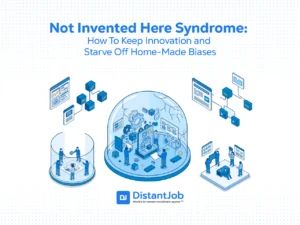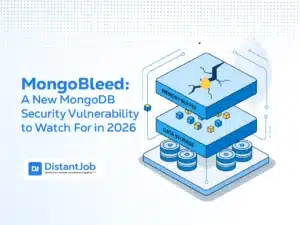Minimizing downtime. Fixing Issues. Cost Efficiency. These three aspects shape the needs of modern software companies. They are not separated: they are interconnected. Site Reliability Engineering (SRE) and DevOps Generalists attend to these needs with different goals and approaches. We will compare SRE vs DevOps in terms of day-to-day duties, focus, and salary.
DevOps is a culture and a philosophy. It accelerates software release cycles through collaboration, automation, and continuous processes such as Continuous Integration and Continuous Delivery (CI/CD). The goal of DevOps is to streamline the entire software delivery pipeline, fostering agility and responsiveness to market demands.
In contrast, SRE is an engineering discipline, coming from Google’s rapid expansion. SRE applies rigorous software engineering principles to operations. Its primary focus is on ensuring the reliability, scalability, and availability of production systems.
Let’s start by defining what an SRE and DevOps engineer is.
What is a Site Reliability Engineer (SREs)?
An SRE is a specialist in software system reliability and performance. The role originated at Google as a way to apply software engineering to operations problems. SREs build customized, automated tools for monitoring, incident response, and capacity management.
The SRE team is responsible for critical IT operations tasks (such as on-call incident handling, system monitoring, and post-incident analysis). The SREs complete these tasks through engineering solutions (automation, self-healing, and performance tuning).
The goal of SRE teams proactively prevent and quickly resolve outages, recording incidents and creating runbooks for future reference.
SRE Engineer Responsibilities
- Automation: An SRE engineer develops and implements tools and automation to eliminate manual and repetitive tasks (known as “toil”), making IT operations more efficient and less error-prone.
- Monitoring and Alerting: SRE Engineers create and maintain monitoring systems to oversee system performance, health, and availability in real time, setting up effective alerts to quickly identify problems.
- Incident Response: Proactively identifying, responding to, and resolving incidents and failures, minimizing downtime and user impact. They also conduct detailed reports after incidents to understand root causes, document lessons learned, and implement preventive measures to prevent recurrences.
- Defining and Achieving SLOs/SLIs: Establishing and monitoring Service Level Objectives (SLOs) and Service Level Indicators (SLIs) to measure and ensure that services meet expected quality standards. SLOs and SLIs are the OKRs of an SRE engineer.
- Release Engineering: Participating in the release process of new features and systems, ensuring they are resilient, scalable, and operable from the start.
- Collaboration: Working closely with development teams (DevOps), fostering a culture of shared responsibility for system reliability.
SRE Engineer Time Allocation:
- Focus: SRE teams spend a large portion of their time on the IT production operations and ensuring system reliability.
- Activities: They focus on monitoring system health, responding to incidents, and ensuring that systems are reliable, scalable, and resilient.
- Metrics: SREs track metrics, including mean time to recovery (MTTR), mean time between failures (MTBF), latency, and error rates, which reflect the stability and performance of systems in production.
- Time Spent: A considerable amount of time is devoted to monitoring, incident management, and capacity planning, with a strong emphasis on utilizing data to drive improvements in system reliability.
What is a DevOps Generalist?
A DevOps generalist (or DevOps engineer) is an IT professional who addresses both sides of development and operations, automating everything from code commit to production so releases ship faster without sacrificing stability. They wear many hats: They help with infrastructure provisioning, CI/CD pipeline maintenance, troubleshooting deployments, and production issues.
Their goal is to streamline from code creation to deployment, breaking down silos between Dev and Ops to deliver features faster without sacrificing stability. Key DevOps practices are continuous integration, continuous deployment (CI/CD), infrastructure as code, and automated testing. They mean that code changes are smaller but more frequent, and easier to fix if something goes wrong.
DevOps engineers are valued for being versatile and cost-efficient. One engineer can handle provisioning, monitoring, and build processes rather than separate specialist teams. However, in larger companies, you might find full DevOps teams that build internal platforms and toolchains for developers (in addition to their usual duties).
DevOps Generalist Responsibilities
- Collaboration and Communication: Acting as a bridge between development and operations teams, breaking down silos and encouraging shared responsibility for the product.
- CI/CD Pipeline Automation: Design, implement, and maintain Continuous Integration (CI) and Continuous Delivery/Deployment (CD) pipelines, automating the building, testing, packaging, and deployment of software.
- Infrastructure as Code (IaC): Writing code to provide and manage infrastructure (servers, database, networks) in an automated and repeatable way, using tools like Terraform, Ansible, and CodeFormation.
- Monitoring and Observability: A DevOps generalist must set up tools to collect logs, traces, metrics, check out the systems’ health, and quickly diagnose problems.
- SDLC Optimization: Continuously search for ways to improve SDLC environments (development, test, deployment), solving bottlenecks and avoiding configuration deviations.
- Security (DevSecOps): Integrate security best practices into the SDLC (shift left).
- Problem Solving: Diagnosing and solving problems in the development and production environment across many tech stacks.
DevOps Time Allocation
- Focus: DevOps teams spend a considerable amount of time on the “left side” of the software development lifecycle – that is, on development and deployment processes.
- Activities: They are heavily involved in building and maintaining CI/CD pipelines, automating deployments, and ensuring smooth transitions between development and production environments.
- Metrics: DevOps teams track metrics, including deployment frequency, lead time for changes, and deployment failure rate, which reflect the efficiency and speed of their processes.
- Time Spent: A significant portion of their time is dedicated to coding, automation, and collaboration with developers to build and release software quickly and reliably.
SRE vs DevOps Side-by-Side Comparison
Both DevOps and SRE mind the gap between software development and IT operations, fostering improved collaboration across these functions. However, they arrive there from different directions: DevOps is a cultural and organizational movement that spans the whole pipeline, whereas SRE is an engineering discipline with formal reliability targets, error budgets, and an ops‑in‑code mindset.
The difference between a DevOps engineer and an SRE is that a DevOps engineer accelerates the whole delivery pipeline through culture and CI/CD automation, whereas an SRE engineer is a software + ops specialist who guards production health with service‑level objectives and error budgets, coding fixes or rollbacks when reliability drifts
To provide a clear comparative overview, the following table summarizes the key principles and objectives of DevOps and SRE:
| Aspects | DevOps Generalist | SRE Engineer |
| Main Focus | Collaboration and automation in the whole SDLC (Dev + Ops). | Reliability, scalability, and availability of the systems |
| Approach | Broader, cultural, working on the processes | More prescriptive, utilizing software engineering principles applied to IT operations |
| Main Activities | Building CI/CD pipelines, Infrastructure as Code (IaC), automation of processes, team integration | Monitoring, incident response, SLOs/SLIs, capacity planning, toil reduction. |
| Relationship | SRE is seen as a practical implementation of DevOps principles, with a focus on reliability | DevOps is the philosophy; SRE is a way to apply this philosophy, guaranteeing reliable systems |
How do SREs and DevOps engineers differ in resolving issues?
Both SREs and DevOps engineers strive for rapid Mean Time to Restore/Resolve (MTTR) when incidents occur. However, their methods differ. According to DORA (DevOps Research and Assessment), high-performing companies often achieve MTTR under 1 hour for critical incidents, whether via strong DevOps practices or SRE involvement.
SREs specialize in rapid incident response with dedicated on-call rotations and can restore critical services in minutes, while DevOps engineers use automation and end-to-end system knowledge to resolve issues, typically achieving restoration in under an hour for elite teams.
SREs are your emergency response specialists. They maintain 24/7 on-call rotations, so someone is always ready to respond within minutes when your systems fail. They keep detailed runbooks for common problems and prioritize quick fixes over perfect solutions.
DevOps engineers tackle outages using automation and their broad system knowledge. They rely on monitoring tools, automated scripts, and infrastructure-as-code to rebuild or reconfigure systems that are broken quickly. Since they understand your entire technology stack, they can often identify root causes faster.
According to DORA research, elite DevOps teams restore service in under one hour on average, while low-performing teams take days or weeks.
In summary, the speed of fixing issues is high for both SREs and DevOps generalists in well-run teams. The table below summarizes some benchmarks and comparisons on resolution speed:
| Resolution Speed Metrics | SRE Team (Dedicated Reliability) | DevOps Generalists (No Dedicated SRE) |
| MTTR (Mean Time to Restore) | Under 1 hour for high-severity incidents.SRE practices have cut MTTR by ~95% in Dropbox. | Reduced significantly by proactive engineering. Dropbox saw 90% fewer outages after introducing SRE. |
| Outage Frequency | Reduced significantly by proactive engineering.Dropbox saw 90% fewer outages after introducing SRE. | Kept low by DevOps automation and testing. |
| After-Hours Incident Response | 24/7 on-call rotation is standard, enabling immediate response at any time. | Smaller DevOps teams might have ad-hoc or limited on-call coverage. |
| Preventative Detection | Extensive monitoring of SLOs/SLIs and automated alerts allows SREs to catch issues early. | Relies on monitoring set up by the team – good DevOps teams have similar alerts on key metrics. |
| Depth of Root-Cause Fixes | SREs aim for permanent fixes after quick restoration. | DevOps teams also value post-mortems and continuous improvement. |
SRE vs DevOps Salaries Comparison
From a purely staffing perspective, SREs are specialized engineers who demand higher salaries due to the critical nature of their work. Maintaining a full SRE team (let’s say, 5-10 SREs for a medium-large organization) is significantly expensive. DevOps generalists, while also skilled, are team members or part of product teams. Companies might not see them as an added cost, but as part of the core engineering headcount.
In the following Comparison Table, you can measure SRE Engineers and DevOps Generalists’ salaries from July 14, 2025:
| ZipRecruiter | SRE Engineer | DevOps Engineer |
| Salaries per Hour (Average) | $64 per hour | $61 per hour |
| Salaries Annually | $132,583 per year | $125,908 per year |
SRE vs DevOps Cost Factors Comparison
Below is a comparison table summarizing cost considerations for SRE vs DevOps. It’s broken down in factors such as: DownTime Reduction, Staffing Costs, Automation and Efficiency, Opportunity Cost, Operations Scalability, and Context Suitability. All these factors must be taken into consideration while deciding who to hire and why.
| Cost Factors | SRE-Focused Approach | DevOps Generalist Approach |
| Downtime Reduction | Strong impact: By cutting downtime and speeding incident recovery, SREs save money directly. | Moderate impact: DevOps practices reduce failures, but if an incident occurs, recovery speed depends on the team. |
| Staffing Costs | Higher upfront: Requires hiring specialized SREs or a team. The more you invest, the more it can pay off by preventing costly incidents. | Lower upfront: Fewer total engineers dedicated solely to ops. A small number of DevOps generalists can support the whole dev team. Be aware that DevOps engineers split their time across many concerns. |
| Automation & Efficiency | Very high: SREs automate manual tasks and optimize systems, which reduces ongoing operational expenses. Over time, it lowers the cost of managing large systems. | High: DevOps culture also pushes automation (CI/CD, infra as code), yielding efficiency gains. Many repetitive processes get scripted, saving labor. |
| Opportunity Cost | Lower ops burden on developers: Having SREs means developers spend less time firefighting and more time delivering features. | Developers (and DevOps engineers) carry the ops load, which can dilute their focus and burden them. |
| Operations Scalability | Scales well for large, complex systems: SRE teams maintain reliability even as systems grow in users and components, without linear growth in failures. | Scales well up to a point: DevOps generalists can handle growth by adopting better tools or splitting into multiple teams. However, larger systems might overwhelm a purely DevOps approach. Bigger companies introduce SRE at this tipping point to keep operational costs proportional to growth. |
| Context Suitability | Best in enterprise or mission-critical contexts where any downtime is extremely costly (financially or reputationally). Also valuable in complex hybrid environments requiring careful reliability oversight. The cost is justified by risk mitigation in these scenarios. | Best in small to mid-size or high-change environments. Ideal when budgets are tight and the cost of an occasional issue is acceptable compared to hiring additional staff. |
Conclusion
In summary, Site Reliability Engineers (SREs) and DevOps generalists both aim to keep systems running and customers happy, but with different emphases. SREs bring a laser focus to reliability and incident response, which in practice often means faster detection and remediation of issues (lower Mean Time To Repair or MTTR) and more permanent fixes.
On the other hand, DevOps generalists contribute by streamlining the software delivery pipeline and preventing many issues upfront. Their automation and collaborative culture lead to fewer deployment errors and quicker fixes. In high-performing DevOps teams, issue resolution can be extremely fast as well (elite teams restore service within an hour on average).
However, maybe you are still not sure if you wish for an SRE Engineer team or a DevOps team for your business.
In that case, contact me. We can think together on which one is tailored for you.
And, if you are interested in hiring, we will find the best SRE engineers or DevOps generalists in the world at half the cost. No hidden fees. No fine print.





